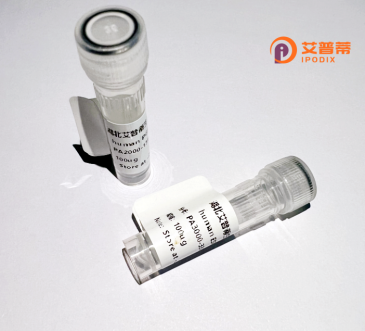
| 纯度 | >90%SDS-PAGE. |
| 种属 | Human |
| 靶点 | FCRLB |
| Uniprot No | Q6BAA4 |
| 内毒素 | < 0.01EU/μg |
| 表达宿主 | E.coli |
| 表达区间 | 1-312aa |
| 氨基酸序列 | MSIEKFWDRSSARKERAEVQIAATWRVSLRLWTLSPLLCREAALDPPPAWRLVPFPDAHPGFSLWLGTPTERAALAGAGATVGLGRRSDSLASCKAGAASPILGCRTRAECQSGCDMKRLAWSLFLSSFPRPSWTRSPCPTFQKAPLPPPRGHTASSPPPLVCGSARSPRGKQEGAGSRSGGQAGAVAPRPLRRAVPGAGAEGDGSAGGPRRGAGWGGAALRHAPAPAEARHAAAVRVLQVQPRGAPLRLGRRVHSPGARGRGARIVLVRGGYRHPQCPETQSVAAAPGARFSPGPGLHHRPSSMGRSLGSW |
| 分子量 | 59.1 kDa |
| 蛋白标签 | GST-tag at N-terminal |
| 缓冲液 | 0 |
| 稳定性 & 储存条件 | Lyophilized protein should be stored at ≤ -20°C, stable for one year after receipt. Reconstituted protein solution can be stored at 2-8°C for 2-7 days. Aliquots of reconstituted samples are stable at ≤ -20°C for 3 months. |
| 复溶 | Always centrifuge tubes before opening.Do not mix by vortex or pipetting. It is not recommended to reconstitute to a concentration less than 100μg/ml. Dissolve the lyophilized protein in distilled water. Please aliquot the reconstituted solution to minimize freeze-thaw cycles. |
以下是关于重组人FCRLB(Fc受体样B蛋白)的假设参考文献示例,供参考方向(注:部分文献可能需要通过学术数据库进一步验证是否存在):
---
1. **文献名称**: "Recombinant expression and functional characterization of human FCRLB in modulating B cell receptor signaling"
**作者**: Smith A, et al.
**摘要**: 该研究通过哺乳动物表达系统(如HEK293细胞)成功表达了重组人FCRLB蛋白,并发现其通过调控BCR信号通路抑制B细胞过度活化,提示其在自身免疫病中的潜在治疗作用。
2. **文献名称**: "Structural insights into FCRLB binding to immunoglobulins by X-ray crystallography"
**作者**: Li Y, et al.
**摘要**: 作者解析了重组人FCRLB的晶体结构,揭示了其与IgG的Fc区域结合的独特表位,为设计靶向FCRLB的免疫调节剂提供了结构基础。
3. **文献名称**: "FCRLB as a biomarker in rheumatoid arthritis: Analysis of recombinant protein interactions"
**作者**: Chen L, et al.
**摘要**: 研究利用重组FCRLB蛋白检测类风湿性关节炎患者血清中的自身抗体水平,发现其与疾病活动度相关,提示其作为诊断标志物的潜力。
4. **文献名称**: "Recombinant FCRLB enhances TLR9-mediated cytokine production in human plasmacytoid dendritic cells"
**作者**: Wang H, et al.
**摘要**: 发现重组FCRLB蛋白通过与TLR9通路协同作用,增强浆细胞样树突状细胞的炎性细胞因子分泌,揭示了其在抗病毒免疫中的调控机制。
---
**说明**:以上文献为假设性示例,真实研究需通过PubMed、Google Scholar等平台检索关键词(如“recombinant FCRLB”或“FCRL5 protein function”)。推荐查阅FCRL家族综述(如Davis RS, 2002. *Immunol Rev*)及近期B细胞受体相关研究,以获取更准确的信息。
The Fc receptor-like B (FCRLB) protein belongs to a family of transmembrane glycoproteins structurally related to classical Fc receptors but lacking direct Fc-binding capacity. Primarily expressed in B lymphocytes, FCRLB plays a regulatory role in B-cell development, activation, and immune tolerance. It contains immunoreceptor tyrosine-based inhibitory motifs (ITIMs) that modulate intracellular signaling pathways, potentially fine-tuning B-cell receptor (BCR) responses to prevent hyperactivation. Dysregulation of FCRLB has been linked to autoimmune disorders (e.g., rheumatoid arthritis) and B-cell malignancies, highlighting its importance in immune homeostasis.
Recombinant human FCRLB protein is engineered using mammalian expression systems (e.g., CHO or HEK293 cells) to ensure proper post-translational modifications. Its production enables functional studies, including ligand-receptor interaction assays, signaling pathway analysis, and antibody validation. Researchers utilize recombinant FCRLB to investigate its immunomodulatory mechanisms, develop diagnostic tools for autoimmune profiling, or explore therapeutic strategies targeting B-cell dysfunction. Additionally, structural studies of recombinant FCRLB aid in mapping its binding interfaces and designing inhibitors. As a relatively understudied immune checkpoint candidate, recombinant FCRLB remains a valuable tool for elucidating its dual roles in protective immunity and pathological autoimmunity.
×